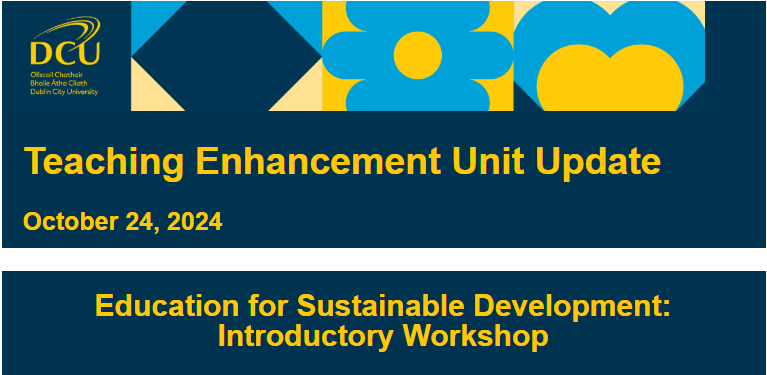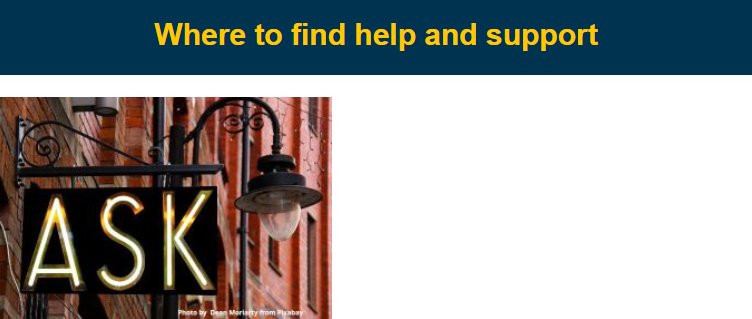
TEU Update October 24 2024

Next year, DCU will offer all staff the chance to achieve the National Forum for Teaching and Learning’s ‘Education for Sustainability’ Digital Badge. However, if you'd like to get a head start and see how ESD fits with your own practice, why not join us for a short workshop: The ABC of ESD.
Date: Wednesday 6th November
Time: 1 - 2pm
Venue: DG10 (Bea Orpen Building, Glasnevin Campus)
Please register here.
ESD hub: available on loop
Don’t forget that all staff have access to the ESD hub on loop. This is a ‘one stop shop’ that introduces the key themes and issues around ESD, as well as providing some ideas for how ESD can be embedded into teaching and learning.

Last Wednesday, Oct 16th, we hosted two webinars to celebrate the International Day of Action for Academic Integrity. In the morning session, three staff members showcased their use of Loop to promote academic integrity: embedding the Library's LETS e-tutorials (Gearóid O’Flaherty), setting up Group Review Tool (Louise Hopper), and creating Loop Planner (Sinéad O'Keeffe). In the afternoon session, four students from diverse backgrounds also shared their experiences, insights, and reflections on promoting academic integrity. Both sessions offered informative and inspiring ideas.
We would like to express our great appreciation to all participants again, and look forward to continued actions and practices that promote academic integrity among staff. The recordings of both sessions and the slides are now available in our Academic Integrity Hub.

Focus on assessment and feedback
Many colleagues will be busy grading student work at present. Although most of you would be familiar with the Loop Assignment tool to collect submissions from students, did you know it also has a host of features for managing, grading and giving feedback on submissions?
Grading online with Loop offers many benefits:
- Provides a single place for students to retrieve their coursework grades
- Offers consistency in how students access and interpret their coursework grades and feedback
- Grading data is contained securely in Loop only, and backed up
- External examiners can be given access to review assignments and grades online
- Reports and analytics allow for lecturers to get insight into assessment trends
- Feedback can take the form of text, video or audio (or all three!)
There are several grading methods available to you within the Loop assignment. Here are two popular ones:
-
Rubrics: Pre-defined rubrics can contain rich feedback for students and make it quick and easy to grade students’ work. A student’s final grade for their submission is automatically calculated by the rubric. Learn more about Loop Rubrics.
-
Ranged Rubrics: This new type of grading method introduced in 2024 gives more flexibility to an assessor, allowing you to select a specific mark to give a student within a criterion, and to differentiate between students in the same band. If you previously used the “Simple Feedback Rubric”, we recommend you switch to this instead. Learn more about Ranged Rubrics.
Quiz Tip: Monitor Progress with Quiz Reports
Use Loop’s built-in quiz reports to track student performance and identify question-level trends. If a significant number of students are getting a particular question wrong, it might indicate either an issue with the question itself or a gap in the teaching material. This data is valuable for making improvements to both your quiz design and your instructional approach. See the Loop Staff Support Page: Quiz Reports for more info.

Assessing eportfolios
Not sure how to assess your students’ Loop Reflect portfolios? Don’t know how to consider their technical or creative outputs? Look no further! This general eportfolio rubric is a good place to start. You could draw on it for inspiration when devising your own grading scheme, or you could use it in its entirety.
If taking the latter approach, this general eportfolio rubric is already set up on a Loop as a template rubric. To use this template rubric in a Loop Assignment on your module page, follow these instructions and search for “Eportfolio Assessment Rubric” among the shared rubric templates.

Simplifying Instructions: Key to Accessible Formative Assessments
Creating accessible quizzes is essential to ensure that all students, including those with disabilities, can fully participate. Start by using clear and direct language in your questions to avoid misunderstandings. Include alternative text for all images and diagrams to assist those using screen readers. Use high contrast colour schemes and avoid using colour alone to convey information. If quizzes have short time windows or time limits, always provide extra time for students who require it by adding a User Override for them.
Utilise the Accessibility+ toolkit to check your quiz for accessibility compliance, helping to identify and resolve potential issues effectively.

In large classrooms, managing student questions can be challenging, but Vevox’s Q&A moderation feature offers an effective solution. With Vevox, students can submit questions anonymously during the lecture using their devices, allowing even quieter or hesitant students to participate. As the instructor, you can moderate incoming questions in real-time, choosing which ones to highlight and address to the class. This allows you to filter out repetitive or off-topic questions, ensuring a more focused and relevant discussion. Additionally, other students can upvote questions, helping you prioritize the most pressing or popular topics. This streamlined approach fosters a more inclusive and organized Q&A session, even in large groups.
See our Loop Staff Support Page for more on using Vevox.

DCU’s Loop partner, Catalyst IT Europe, hosts its community learning event for all its higher education partners on Wednesday 13 November. This event will share stories of digital education and learning technology practice from a range of institutions such as Maynooth University, University of the Arts London, and more. All DCU staff are welcome to attend.
The event will take place online, with a local hub operating in Maynooth University, which DCU staff are welcome to travel to if they wish to attend online in an in-person group.
For more details and to register, visit the Catalyst event page.

If you require assistance or guidance with teaching and learning or Loop related matters, avail of the below methods.
Support for technical issues
For Loop technical queries, go to help.dcu.ie. You can also attend one of our regular online Loop drop in clinics, details in the TEU calendar. The drop in clinics are particularly useful for more complex queries. The Loop Staff Support Page also provides a comprehensive range of resources on Loop and Zoom. For new users, the enrolment key for this page is ‘staff’.
Advice on using technology for Teaching and Learning
If you are looking for advice on developing your teaching practice, including but not limited to the application of technology, please contact the TEU team teaching.enhancement@dcu.ie. We will endeavour to respond to you as soon as possible.
Consultancy request form
Interested in requesting a workshop or more extended consultation on a specific topic? Use this form.

